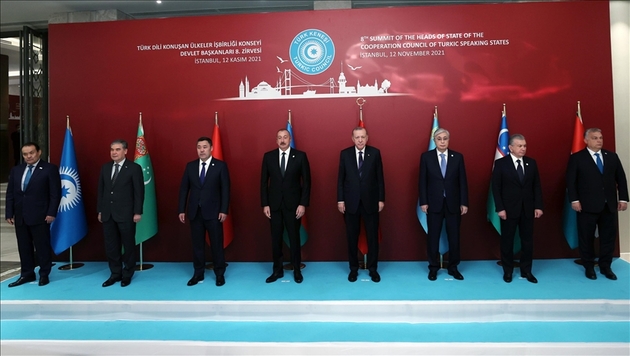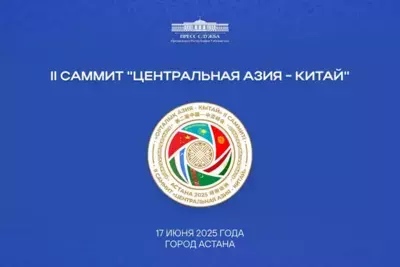Transformation of Turkic Council into "Organization of Turkic States", which was announced following the VIII Summit of the Turkic Council, held on the Democracy and Freedom Island in the Sea of Marmara, near Istanbul, was a historical development .
Anadolu Agency says that the Turkish world already has a population of 300 million, an area of 4.5 million square kilometers, and an economy of $2 trillion. In the 21st century, when the weight center of the economy shifts to Asia, the integration of Turkey and Azerbaijan by 2040 with Turkestan, which is located on the Silk Road route between Europe and Asia, will provide important opportunities for the Turkic world. The phrases of "the Turkic-speaking countries," "Peoples with Turkic language," and "Turkic-speaking peoples" were produced by Nikolay Ivanovich Ilminski. These terms were based on the educational method to accelerate Russification activities by dividing the Turkic peoples by making Turkic dialects into different languages. With this name change, the terms "Turkic-Speaking Peoples and Countries," which are widely used in the geography of Turkestan, have been replaced by "Turkic Peoples or States." It is necessary to consider this change as a radical transformation of mentality rather than a symbolic name change.
Messages from leaders
In the opening speech of the summit, Turkish President Recep Tayyip Erdoğan touched upon the issue of recognizing the just cause of the Turkish Republic of Northern Cyprus (TRNC). The emphasis on the fact that the trade volume between the member states of the organization has not reached the desired level, which should be emphasized, should also be noted. Azerbaijani President Ilham Aliyev praised President Recep Tayyip Erdoğan as the leader of the Turkic world. Nursultan Nazarbayev, the founding President of Kazakhstan, who has very important services to the unity and togetherness of the Turkic world, attended the summit via video conference ans said: "With this summit, we can convey the message to all our sisterly and brotherly peoples around the world that Turkic civilization has begun to revive, the Turkic states have come together and established a new agenda item and ideology". The President of the Republic of Kazakhstan, Kassym-Jomart Tokayev, emphasized the era of former Turkish Prime Minister Adnan Menderes (1899-1961), who "opened his heart to the Kazakh sisters and brothers." Tokayev spoke about the support provided by the Turkish people and personally by Menderes to the Kazakh people forced to leave their homeland and move to Turkey in the last century. The participation of the President of Turkmenistan Kurbankulu Berdimuhammedov, who has been wary of the Turkic Council since the beginning, in this summit, where Turkmenistan became an observer member, shows hope for the unity and togetherness of the Turkic world.
Vision of Turkic World 2040
Adopting the "Vision of the Turkic World 2040" initiated by Nursultan Nazarbayev will serve to embody cooperation between the member states. If it can be passed from force to action, this roadmap will ensure the cooperation of the Turkic world, especially in the economic sphere.In the final declaration of the summit, the registration of Azerbaijan's Karabakh victory and right by the organization's member states once again is also a deterrent against threats to the member states from now on. Because Turkey's unconditional support for Azerbaijan during the war had found great support for the Turkic peoples. It is a good start for the member states to express their solidarity with the Turkish Cypriot people and recognize the request that Turkey and the people in Northern Cyprus be invited to participate in the relevant activities of the Organization of Turkic States to break the unfair isolation of the Turkish Cypriots and recognize them in the coming years.
Economic integration
One of the most important decisions of this summit is strengthening economic ties between the member states. The most notable decision in this regard is the formation of the "Turkic Investment Fund," which will be created with the equal capital contribution of the member states by Sept. 1, 2022. Establishing a common development fund means a union of forces in the economic sense, and this may also be a harbinger of greater cooperation in the future. The decisions taken regarding the economic cooperation of the member states, increasing the trade volume and the Caspian Transit International East-West Central Corridor, which are vital for the development of the Silk Road, should be taken with due attention. The invitation of Kazakhstan to participate in the economic zone "TURANSEZ," which will be established for the Turkic states in the city of Turkestan, was welcomed by the member states. To use this corridor as a more efficient and uninterrupted route, the "International Combined Cargo Transportation Agreement between the Member States of the Organization of Turkic States" has taken its last shape to simplify troublesome customs procedures among the member countries. Supporting Azerbaijan's efforts to integrate the Zangezur Corridor into the Caspian International East-West Central Corridor are also important steps in terms of economic integration between the member states.
Cooperation in fields of education, culture
Among the decisions taken at the summit, education and culture are also important ones. The importance of establishing an international television channel broadcasting to the Turkic world was emphasized at the summit. The decisions are taken by the organization's member states to strengthen the Orhun Exchange Program in the field of higher education and prepare student exchange programs in secondary education also show promise in terms of ensuring integration in the field of education. The decisions about the expansion of the Turkic Universities Association (TURKUNIB) with the participation of new universities from Uzbekistan, Kyrgyzstan and Turkey, simplification of the founding procedures of schools to be built in the Turkic world by Turkey's Maarif Foundation (TMV), and preparation of course books on "Common History of Turks," "Geography of Turkic World" and "Common Turkic Literature" are also admirable. One more important decision is eliminating bureaucratic obstacles. If, by 2040, the member states show their will to implement the articles mentioned above, the obstacles to referring to the 21st century as a "Turkic Century" will also disappear.
















